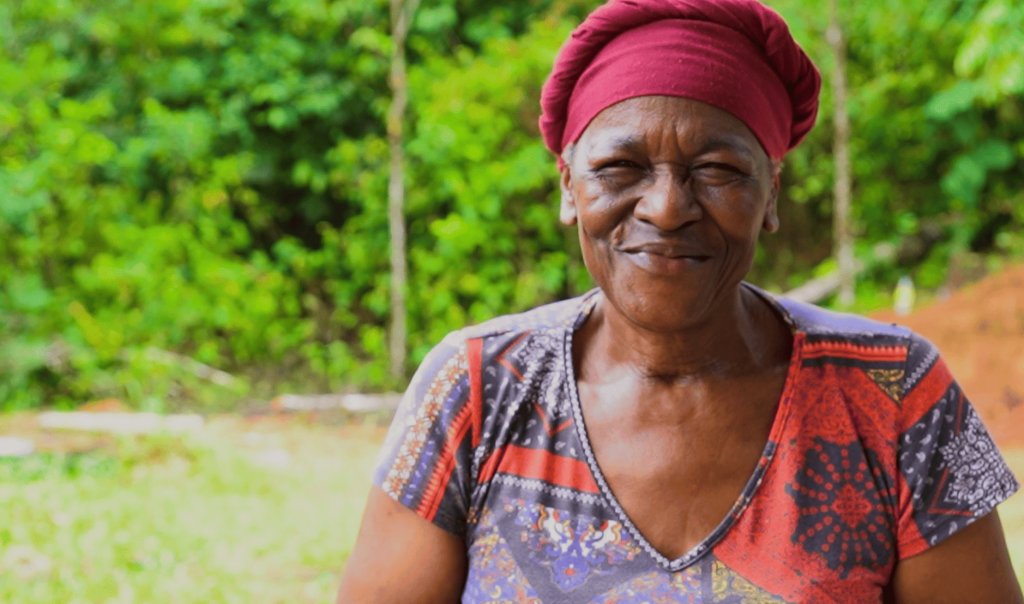In Colombia’s Southern department of Putumayo, where dense jungle meets the Ecuadorian border, broken trees stand as silent witnesses to decades of violence. Yet from these fractured roots, an extraordinary story of resilience blooms – one being documented by filmmaker Ana Cristina Ayala. Juntas was made thanks to the financial support of the European Union in collaboration with the Ong COSPE and the Alianza de Mujeres Tejedoras de Vida. She filmed these women telling stories while they make food for the barrio. Joking, laughing. Living their life.
Roots severed and reforged: women’s stories in Putumayo
“I’ve been privileged because neither me nor my daughters were victims of sexual violence”, reflects Filonila Caicedo, her hands busy peeling potatoes. This simple statement carries the weight of countless told and untold stories, for in Putumayo, privilege is measured not in wealth but in survival. As a matter of fact since the 1980s, this remote region has been ground zero for Colombia’s complex tapestry of violence. Drug cartels, paramilitary groups, and guerrilla forces have torn through communities like hurricane winds through a forest.

The women of Putumayo have borne the brunt of this storm. Their stories, captured in intimate portraits by Ayala, reveal the particular cruelty reserved for mothers in conflict zones. Sometimes motherhood is severed even before birth. “She was only 17 and 7 months pregnant, and the paramilitaries drove her to the slaughterhouse, in San Miguel”, recounts Amparo Garrido, who defends the rights of the Awa population. Like her, many others. These are the “broken trees” – women whose branches of motherhood were severed by violence, displacement, and fear.
Construcion of peace: the work of Tejedoras de Vida
Yet from this seemingly barren soil, something remarkable has taken root. The Alianza de Mujeres Tejedoras de Vida emerged as a response to over 50 years of armed conflict, focusing on what they call construcción de paz – the construction of peace. In a region where the state’s presence has been historically weak, these women have become the architects of their own recovery.
Their work is both practical and profound. In neighborhoods built for displaced women, they create new communities from the ground up. Their hands, adorned with colorful handcrafted jewelry, work tirelessly – not just at daily tasks like food preparation, but at the deeper labor of rebuilding social fabric shredded by decades of violence. The documentary captures these moments in vibrant yellows, oranges, and purples, colors that seem to defy the history they carry.
The transformation these luchadoras embody is particularly striking against the backdrop of 1980s Putumayo, when figures like Pablo Escobar’s associate Gonzalo Rodriguez Gacha funded paramilitary groups that terrorized the region. While they wielded weapons, these women began wielding something more powerful – the tools of social reconstruction. They understood that peace isn’t just the absence of violence; it’s the presence of justice, dignity, and community.
Women who transform and build peace
Their approach to peace-building is distinctly feminine, rooted in an understanding that healing must address both visible and invisible wounds. They focus on human rights, reconciliation, and gender-specific approaches to territory and peace. In a culture long dominated by machismo and violent masculinity, these women offer an alternative vision of strength – one based not on the ability to destroy, but on the capacity to nurture and rebuild.
“Crying and complaining will do no good,” says Fatima Muriel, the leader of Alianza de Mujeres Tejedoras de Vida del Putumayo. Her eyes fixed on the camera. Despite natural disasters like the one on March 31, 2017, which struck Mucoa, Putumayo, these broken trees come together in community, strengthen their roots, and face every storm.
The women’s serene expressions captured in Ayala’s documentary belie the tremendous weight these women carry. They are not just survivors; they are flowers in bloom, turning their personal tragedies into fuel for collective healing. As one member of the Alliance explains, they are weaving not just individual lives back together, but the very fabric of society.
In documenting their story, Ayala reveals how these “Mujeres que transforman” have created something remarkable: a model of grassroots peace-building that begins with acknowledging wounds but doesn’t end there. Like the broken trees that dot their landscape, they prove that new life can spring from seemingly dead wood, that peace can be woven from threads of shared pain, and that the strongest communities often grow from the deepest scars.

